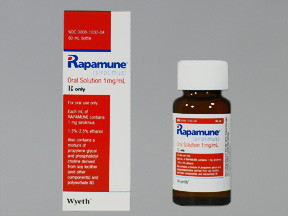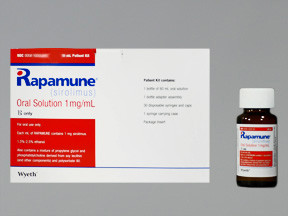SIROLIMUS SOLUTION - ORAL
PHONETIC PRONUNCIATION: (sir-OH-li-mus)
COMMON BRAND NAME(S): Rapamune
GENERIC NAME(S): sirolimus
Uses
USES: Sirolimus is used with other medications to prevent rejection of a kidney transplant. This medication belongs to a class of drugs known as immunosuppressants. It works by weakening your body's defense system (immune system) to help your body accept the new organ as if it were your own. Sirolimus may also be used to treat a certain lung disease (lymphangioleiomyomatosis-LAM).
How to use SIROLIMUS SOLUTION - ORAL
HOW TO USE: Read the Medication Guide and Instructions for Use provided by your pharmacist before you start taking sirolimus and each time you get a refill. If you have any questions, ask your doctor or pharmacist. Take this medication by mouth as directed by your doctor, usually once daily. If you have nausea or an upset stomach, you may take this medication with food. However, it is important to choose one way (with food or without food) and take this medication the same way with every dose. Carefully measure the dose using the amber oral dose syringe provided. Do not use a household spoon because you may not get the correct dose. Mix the measured dose with at least 2 ounces (one-fourth cup/60 milliliters) of water or orange juice in a plastic or glass container. Do not mix with any other liquids. Stir well and drink all of the mixture right away. Refill the container with at least 4 more ounces (one-half cup/120 milliliters) of water or orange juice, stir well, and drink it right away. Do not prepare a supply in advance. The oral dose syringe should only be used once and thrown away. Use a new syringe for each dose. The dosage is based on your weight, medical condition, laboratory tests (such as sirolimus trough levels), and response to treatment. Take this medication regularly to get the most benefit from it. To help you remember, take it at the same time each day. Do not increase your dose or take this medication more often than prescribed. Your condition will not improve any faster, and your risk of side effects will increase. Also, do not stop taking this medication without consulting your doctor. If you are also taking cyclosporine, take sirolimus 4 hours after your cyclosporine dose. Consult your pharmacist for more information. Avoid eating grapefruit or drinking grapefruit juice while using this medication unless your doctor or pharmacist says you may do so safely. Grapefruit can increase the chance of side effects with this medicine. Ask your doctor or pharmacist for more details. If you are taking this medication to treat LAM, tell your doctor if your condition worsens.
Side Effects
Precautions
Interactions
Overdose
Images
Reviews
Faq for SIROLIMUS SOLUTION - ORAL
Sirolimus Solution is an oral medication that belongs to a class of drugs called mTOR inhibitors. It is used to prevent organ rejection in patients who have received a kidney transplant.
Sirolimus Solution works by suppressing the body's immune system, preventing it from attacking the transplanted organ. It inhibits a protein called mTOR, which plays a role in the growth and division of cells involved in the immune response.
Common side effects of Sirolimus Solution may include mouth ulcers, diarrhea, nausea, headache, acne, and high cholesterol levels. It may also increase the risk of infection and decrease wound healing.
Sirolimus Solution should be taken exactly as prescribed by your doctor. It is usually taken once daily, either with or without food. It is important to take it at the same time each day. Do not crush or chew the tablets, swallow them whole with a glass of water.
It is generally recommended to avoid alcohol while taking Sirolimus Solution, as it can increase the risk of certain side effects such as liver damage and drowsiness.
If you miss a dose of Sirolimus Solution, take it as soon as you remember. However, if it is close to the time for your next dose, skip the missed dose and continue with your regular dosing schedule. Do not take a double dose to make up for a missed one.
Sirolimus Solution may interact with certain medications, including other immunosuppressants, antifungal drugs, antibiotics, and some antidepressants. It is important to inform your doctor about all the medications you are currently taking to prevent any potential interactions.
Sirolimus Solution may be used in pediatric patients aged 13 years and older who have received a kidney transplant. However, the dosage and safety in younger children have not been established.
Sirolimus Solution is not recommended for use during pregnancy as it may harm the fetus. It is also not known if the medication passes into breast milk, so breastfeeding should be avoided while taking Sirolimus Solution.
Sirolimus Solution is usually taken once daily on an empty stomach, at least 4 hours after a meal. It is important to follow the dosage instructions provided by your healthcare provider. Do not crush or chew the solution, swallow it whole.
Common side effects of Sirolimus Solution may include mouth sores, diarrhea, nausea, vomiting, headache, and increased cholesterol levels. Serious side effects may include infection, fluid retention, increased risk of certain types of cancer, and kidney problems. Contact your doctor if you experience any unusual or severe side effects.
Sirolimus Solution may increase the risk of developing infections, including serious fungal and viral infections, and certain types of cancer. It may also cause birth defects if used during pregnancy. It is important to discuss your medical history and any current medications with your doctor before starting Sirolimus Solution.
The duration of Sirolimus Solution treatment will be determined by your doctor based on your individual circumstances. Most patients will need to take it indefinitely to prevent organ rejection after a kidney transplant.
Warning
WARNING: Sirolimus lowers the body's ability to fight an infection/disease (immunosuppression). This may increase your risk of developing an infection or certain types of cancer (such as skin cancer, lymphoma). To reduce the risk of these serious side effects, take this medication at the lowest effective dose as directed by your doctor. Keep all medical and laboratory appointments. Tell your doctor right away if you develop any of the following: unusual skin changes, change in the appearance/size of moles, unusual growths/lumps, swollen glands, night sweats, unexplained weight loss, signs of infection (such as sore throat that doesn't go away, fever). Sirolimus is not recommended for the prevention of rejection of liver or lung transplants because it has rarely caused very serious (possibly fatal) liver/lung problems in those cases.
Disclaimer
IMPORTANT: HOW TO USE THIS INFORMATION: This is a summary and does NOT have all possible information about this product. This information does not assure that this product is safe, effective, or appropriate for you. This information is not individual medical advice and does not substitute for the advice of your health care professional. Always ask your health care professional for complete information about this product and your specific health needs.


No Reviews Yet